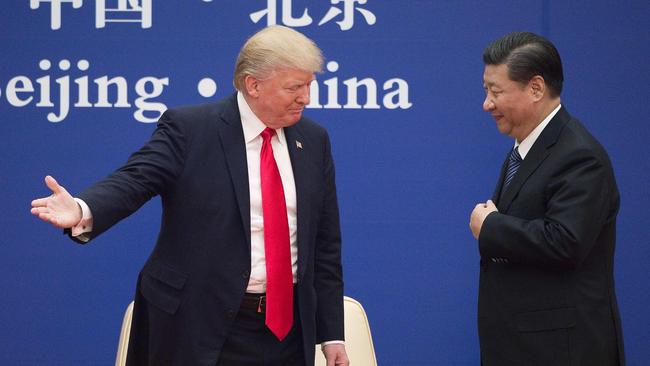With a trade war and Brexit, March will be a dangerous month
Donald Trump can smell weakness in his opponent China, but it’s vital he heeds the Ides of March and doesn’t overplay his hand.

Set aside your views of Donald Trump. We have in the White House a President who believes he can sense weakness in an opponent. And my American contacts say that right now he can smell serious weakness in China.
Australia, the rest of Asia and parts of Europe have to hope that the Trump antenna is wrong, because the repercussions of a serious China decline are monumental.
This week Trump watched China’s President Xi Jinping suddenly, and with little warning, call a meeting of China’s top leaders. The meeting was held behind closed doors, but reports say he stressed the need to maintain political stability given the social implications of the slowing economy. President XI said that Chinese Communist Party needed greater efforts “to prevent and resolve major risks.”
The central bankers have already relaxed credit.
At the same time dissidents (such as Australia-Chinese writer Yang Hengjun) are being taken into custody. In Trumpland, that’s a sign of weakness. Accordingly the US cancelled plans to have trade talks at the World Economic Forum in Davos, but talks are still scheduled in the US.
Australians need to understand the dangers President XI is facing - risks that multiply those of a trade war with the US. China watchers believe that while China’s growth rate is officially some 6.4 per cent, the real rate of growth is much lower - probably around 4 per cent and slowing.
This rate of growth is not sufficient sustain the enormous debt in the country. China used debt to overcome the global financial crisis, causing its debt ratios to double to 270 per cent of GDP in just over a decade. When the GFC threat was at its peak, Chinese bankers had lending quotas that they were forced to meet. Very little of those loans can ever be repaid.
China saw dominance in global technology as an important long-term lever to overcome its underlying problems. The US called a halt to the technology transfer and started a trade war to gain better access to China and protect its technology.
The economic effects of excess debt and the trade war come as China is grappling with pollution. This is causing it to shut down old plants and to diversify energy sources. Australia’s high-grade iron ore and coal were beneficiaries in 2018 but 2019 will likely see a fall in coal exports to China. China is also experiencing a falling birthrate and a rise in social discontent.
China has always overcome such hurdles in the past and world markets believe it will do it again. But the Chinese sharemarket is not as confident, and the Shanghai index is down more than 25 per cent in a year.
But if President Trump overplays his position - always a big danger- China has the economic equivalent of the atom bomb. It can start selling its vast investments in US government securities and offshore global funds. It has already a slashed its investment in the US and instructed its large developers to sell big apartment sites in Australia. These are warning signs.
Falling US bond prices would drive up global interest rates at a time when President Donald Trump’s trillion-dollar deficits are set to put the US bond market under pressure.
The effect on highly leveraged US companies would be severe, but the flow on into Asia and Europe would be much worse. Australia’s over-borrowed consumers would be hit hard by higher global rates, as would our trade.
There is a March 2 deadline on the current round of US-China trade talks. If there is no deal by that time, the US will raise tariffs further.
If China finds itself trapped in a corner it will probably threaten to raise US interest rates by selling US securities. But if it ever took such a drastic action China itself would also be hit hard.
So if China threatens to quit US bonds will President Trump call its bluff? I don’t know.
But the US-China trade talks reach a deadline in the same month as the Brexit deadline. While the world focuses on Brexit, the Asian downturn has already hit European industry. Germany and Italy are in the front line, while confidence in France has slumped.
Clearly Europe has much deeper problems than the Asian downturn, but if an economic crisis gathers momentum, Europe has exhausted all its conventional economic defences. Interest rates are negative and the European central bank has already bought vast quantities of bonds and securities.
Unlike the US, Europe is not sufficiently united to establish a crisis machinery. Brexit could not have come at a worse time.
By contrast in China, the state owns the banking system and, in a looming recession, it has levers it can pull that not available to western countries.
Commenting on the looming China crisis, Harvard professor and former chief economist at the International Monetary Fund, Ken Rogoff, told the WEF in Davos: “I fear this will be the third leg of the global debt supercycle, after subprime in the US and the eurozone debt crisis.
“Nobody knows how this is going play out but it could be on the scale of 2008 and will be very bad for Asia, and there will be spillovers in Europe.”
We need to be aware of the dangers and heed the Ides of March.



